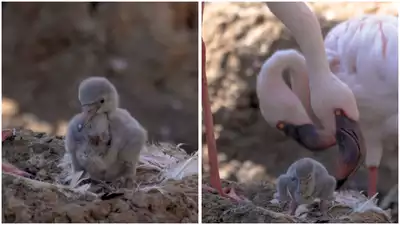[ad_1]

Two male lesser flamingos at the San Diego Zoo Safari Park have become first-time dads after successfully hatching an egg together.
The Guardian reported that the couple, both in their 40s, have demonstrated remarkable parenting skills, alternating brooding duties and nourishing their chick with nutrient-rich crop milk.
“The pair have perfected their fatherly duties by alternating brooding responsibilities and keeping the chick satisfied thanks to a hearty helping of crop milk every day,” said the San Diego Zoo.
Two Male Flamingos at Safari Park Raise Foster Chick
Dads on duty 🦩Two male lesser flamingos are fostering a chick after showing off their parenting skills with a dummy egg earlier this year. Wildlife care specialists sneakily swapped a fertile egg into their nest, allowing another pair of flamingos to double-clutch and raise a second hatchling. The pair has perfected their fatherly duties by alternating brooding responsibilities and keeping the chick satisfied thanks to a hearty helping of crop milk every day.
Posted by San Diego Zoo Safari Park on Thursday, September 26, 2024
The duo had previously demonstrated their parenting abilities with a dummy egg earlier this year. As a result, wildlife care specialists swapped a fertile egg into their nest, allowing another flamingo pair to double-clutch and raise a second hatchling.
Interestingly, both male and female flamingos can produce milk and even non-parent flamingos may act as foster feeders. As the chick’s begging calls trigger the secretion of milk, the parents gradually lose their pink colour, which they regain once the chick becomes independent.
When the chick is old enough, it will transition to a pellet diet designed for all flamingos at the zoo, which includes the necessary nutrients and pigment to maintain their iconic pink hue.
This is not the first time same-sex flamingo pairs have successfully fostered chicks. Earlier this year, a similar event occurred at a UK zoo with male flamingos Curtis and Arthur hatching a chick.
Flamingos typically lay a single large, chalky white egg in a mud nest built by the parents, resembling a sandcastle. These nests can reach up to 2 feet in height, providing protection from rising water. After hatching, the chick is covered in grey down feathers, about the size of a tennis ball, with a straight pink bill and pink legs that turn black within a week.
The chick will remain on the nest mound for 5 to 12 days, during which time it will rely on crop milk for sustenance. Same-sex co-parenting in the bird world is more common than often realised, with species like penguins and vultures also reported as foster parents in zoos worldwide.
[ad_2]
Source link


